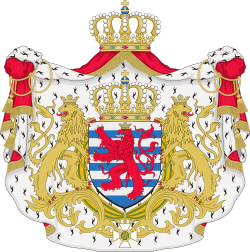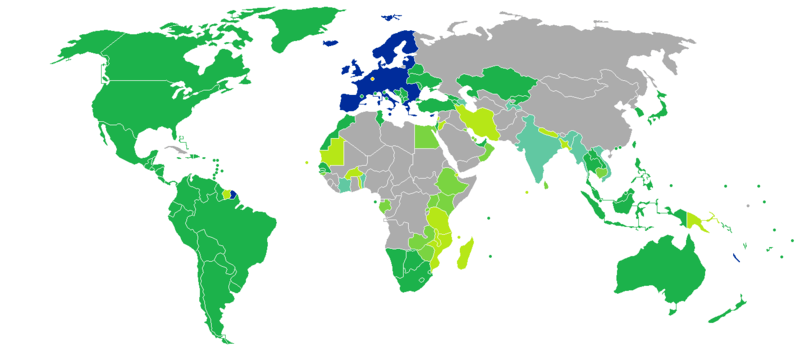Luxembourgish nationality law
| Luxembourgish Citizenship Act | |
|---|---|
 | |
| Parliament of Luxembourg | |
|
Loi du 8 mars 2017 sur la nationalité luxembourgeoise et portant abrogation de : 1. la loi du 23 octobre 2008 sur la nationalité luxembourgeoise ; 2. la loi du 7 juin 1989 relative à la transposition des noms et prénoms des personnes qui acquièrent ou recouvrent la nationalité luxembourgeoise | |
| Enacted by | Government of Luxembourg |
| Date commenced | 01 April 2017 |
| Status: Current legislation | |
Luxembourgish nationality law is ruled by the Constitution of Luxembourg. The Grand Duchy of Luxembourg is a member state of the European Union and, therefore, its citizens are also EU citizens.
Nationality by Birth
Luxembourgish law generally follows jus sanguinis with limited jus soli provisions. Citizenship is automatically given to:[1]
- a child of a Luxembourgish citizen parent, regardless of the place of birth;
- a child born in Luxembourg to a parent born in Luxembourg; or
- a child born in Luxembourg to parents who are stateless or unable to pass their nationality onto their child; or
- a child born in Luxembourg to unknown parents.
Naturalization
Naturalization is permitted under several conditions:[2]
- being at least eighteen years old
- five years of legal residence in the Grand Duchy, including an uninterrupted period of one year immediately before applying for citizenship
- passing an exam testing knowledge of the Luxembourgish language
- taking a course on "living together in the Grand Duchy" and passing the associated examination
Obtaining nationality by option is permitted to, among others:[3]
- those married to a Luxembourgish citizen for at least three years, provided the language and "living together in the Grand Duchy" examinations are passed;
- those born in Luxembourg to non-Luxembourgish parents, upon reaching the age of 12, provided the parents legally resided in Luxembourg for the twelve months prior to their birth;
- those who have continuously lived in Luxembourg for twenty years if a language course is taken; and
- those who have had seven years of schooling in the Grand Duchy.
It is also possible to "recover" Luxembourg nationality if one can prove he had an ancestor who was Luxembourgish as of 1 January 1900. The Luxembourg diaspora at the time moved to France, Belgium and the US. As of the end of 2013, thousands of people recovered the nationality of their Luxembourgish ancestor.
Dual citizenship
Since 1 January 2009, Luxembourg has allowed dual citizenship.[4] Since then, many Belgians have made use of the new law to adopt Belgian-Luxembourgish citizenship, especially Belgians living in Arelerland, a part of the Belgian province of Luxembourg at the border with the Grand Duchy.[5]
Citizenship of the European Union
Because Luxembourg forms part of the European Union, Luxembourgish citizens are also citizens of the European Union under European Union law and thus enjoy rights of free movement and have the right to vote in elections for the European Parliament.[6] When in a non-EU country where there is no Luxembourgish embassy, Luxembourgish citizens have the right to get consular protection from the embassy of any other EU country present in that country.[7][8] Luxembourgish citizens can live and work in any country within the EU as a result of the right of free movement and residence granted in Article 21 of the EU Treaty.[9]
Travel freedom of Luxembourgish citizens
Visa requirements for Luxembourgish citizens are administrative entry restrictions by the authorities of other states placed on citizens of Luxembourg. In 2015, Luxembourgish citizens had visa-free or visa-on-arrival access to 171 countries and territories, ranking the Luxembourgish passport 3rd in the world according to the Visa Restrictions Index.
In 2017, The Luxembourgish nationality is ranked sixteenth in Nationality Index (QNI). This index differs from the Visa Restrictions Index, which focuses on external factors including travel freedom. The QNI considers, in addition, to travel freedom on internal factors such as peace & stability, economic strength, and human development as well. [10]
References
- ↑ https://guichet.public.lu/en/citoyens/citoyennete/nationalite-luxembourgeoise/possession-automatique/effet-loi.html
- ↑ http://www.guichet.public.lu/entreprises/en/ressources-humaines/recrutement/nationalite/naturalisation/index.html
- ↑ http://www.guichet.public.lu/entreprises/en/ressources-humaines/recrutement/nationalite/option/index.html
- ↑ "Dual Citizenship". Washington, D.C.: Embassy of Luxemburg. Retrieved 2009-02-12
- ↑ "Veel Belgen willen ook Luxemburger worden" (in Dutch). 2011-01-21. Retrieved 2011-01-22.
- ↑ "Luxembourg". European Union. Retrieved 4 May 2015.
- ↑ Article 20(2)(c) of the Treaty on the Functioning of the European Union.
- ↑ Rights abroad: Right to consular protection: a right to protection by the diplomatic or consular authorities of other Member States when in a non-EU Member State, if there are no diplomatic or consular authorities from the citizen's own state (Article 23): this is due to the fact that not all member states maintain embassies in every country in the world (14 countries have only one embassy from an EU state). Antigua and Barbuda (UK), Barbados (UK), Belize (UK), Central African Republic (France), Comoros (France), Gambia (UK), Guyana (UK), Liberia (Germany), Saint Vincent and the Grenadines (UK), San Marino (Italy), São Tomé and Príncipe (Portugal), Solomon Islands (UK), Timor-Leste (Portugal), Vanuatu (France)
- ↑ "Treaty on the Function of the European Union (consolidated version)" (PDF). Eur-lex.europa.eu. Retrieved 2015-07-10.
- ↑ "The 41 nationalities with the best quality of life". www.businessinsider.de. 2016-02-06. Retrieved 2018-09-10.
External links
- (in French) Luxembourg's Ministry of Justice website
- (in French) About the new nationality law
